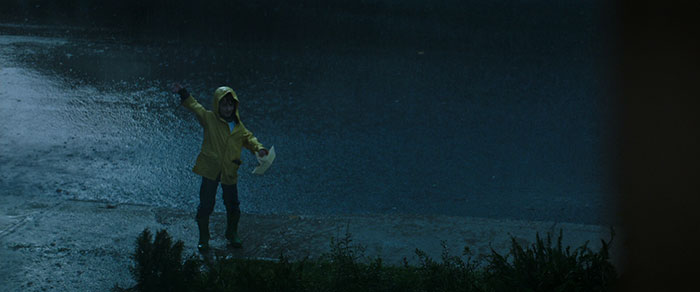 Please note that all framegrabs are from the 1080p version
Please note that all framegrabs are from the 1080p version
It: Chapter One
****/**** Image A- Sound A Extras B+
starring Jaeden Lieberher, Wyatt Oleff, Jeremy Ray Taylor, Bill Skarsgård
screenplay by Chase Palmer & Cary Fukunaga and Gary Dauberman
directed by Andy Muschietti
 by Walter Chaw There’s a girl, Beverly (Sophia Lillis), she must be around thirteen or so, she’s standing in front of a wall of tampons at the drugstore, trying to make a decision on her own because her dad (Stephen Bogaert) is alone, and a creep, you know, a little scary in how he keeps asking her if she’s still his “little girl.” So she has to do this by herself, even though it’s embarrassing–but she’s doing it. The next aisle over, a few boys, they call themselves “The Losers” because why not, everyone else does, are gathering medical supplies to help the new kid, Ben (Jeremy Ray Taylor), who’s been cut up pretty bad by bully Henry (Nicholas Hamilton). They need a distraction because they don’t have enough money to pay, so Bevvie provides one, and now she’s a “Loser,” too. I read Stephen King’s It in September of 1986, when I was thirteen. Thirteen exactly the age of its heroes in the “past” of the book, the flashback portion that’s paralleled with the kids, as adults, called back to the Derry, ME of their youth, where they had forgotten that, once upon a time, they fought a thing and won. There is nothing better when you’re thirteen than Stephen King. It was my favourite book for a while, although I didn’t entirely understand why. I think I might now. Better, I believe Andy Muschietti, director of the underestimated Mama, and his team of three screenwriters, Chase Palmer, Cary Fukunaga, and Gary Dauberman, understand that what works about It isn’t the monster, but the fear of childhood as it metastasizes into the fear of adulthood–and how those two things are maybe not so different after all.
by Walter Chaw There’s a girl, Beverly (Sophia Lillis), she must be around thirteen or so, she’s standing in front of a wall of tampons at the drugstore, trying to make a decision on her own because her dad (Stephen Bogaert) is alone, and a creep, you know, a little scary in how he keeps asking her if she’s still his “little girl.” So she has to do this by herself, even though it’s embarrassing–but she’s doing it. The next aisle over, a few boys, they call themselves “The Losers” because why not, everyone else does, are gathering medical supplies to help the new kid, Ben (Jeremy Ray Taylor), who’s been cut up pretty bad by bully Henry (Nicholas Hamilton). They need a distraction because they don’t have enough money to pay, so Bevvie provides one, and now she’s a “Loser,” too. I read Stephen King’s It in September of 1986, when I was thirteen. Thirteen exactly the age of its heroes in the “past” of the book, the flashback portion that’s paralleled with the kids, as adults, called back to the Derry, ME of their youth, where they had forgotten that, once upon a time, they fought a thing and won. There is nothing better when you’re thirteen than Stephen King. It was my favourite book for a while, although I didn’t entirely understand why. I think I might now. Better, I believe Andy Muschietti, director of the underestimated Mama, and his team of three screenwriters, Chase Palmer, Cary Fukunaga, and Gary Dauberman, understand that what works about It isn’t the monster, but the fear of childhood as it metastasizes into the fear of adulthood–and how those two things are maybe not so different after all.


